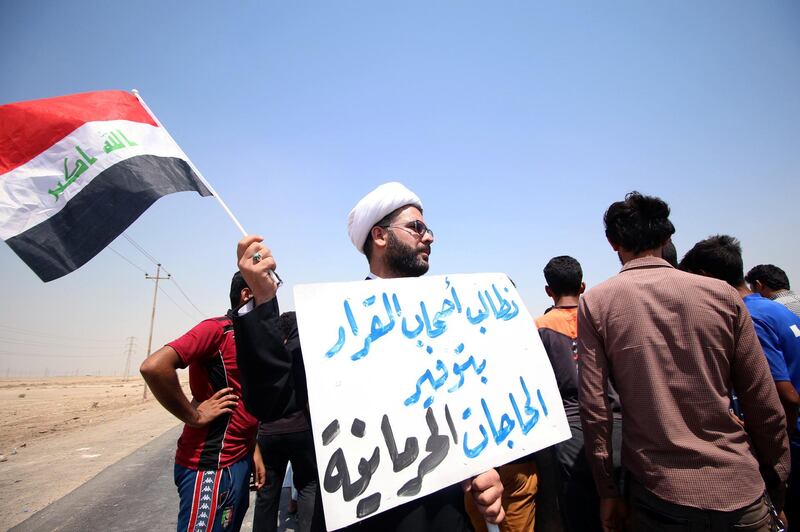The staccato of teargas being fired resounds in a video of Basra's protests, scattering young men. Some brandish stones, angrily threatening at a group of Iraqi security forces deployed to disperse ongoing demonstrations.
Week-long protests have rocked Iraq's southern Basra province with civilians spilling onto the streets to demand jobs, access to basic services, and economic growth.
"They are firing live ammunition and teargas," one man says.
Demonstrations in southern Iraq are not unusual in scorching summer weather, but they boiled over last Tuesday, when security forces opened fire, killing one person and wounding five. By Sunday, two more had been killed.
Within days the rallies spread to other provinces, including Najaf and Karbala. At least 30 were wounded on Saturday night in Karbala, while international flights to Najaf were cancelled.
In some places, protesters broke into local government buildings and burned the offices of political parties, including the offices of the Iran-backed Badr Organisation. On Monday security forces started arresting protesters.
"These protests have happened every summer in the south," said Dr Renad Mansour, a research fellow for Middle East and North Africa at Chatham House. "What's different and why it's political, is that it comes off of the elections a few months ago where the low turn out was an indicator of how disillusioned they are," he said. "People don’t have hope in change. The sense of hopelessness is the guiding light behind these protests."
A lack of running water and reliable electricity is foremost among the grievances.
“It’s a shame that I am demanding water in 2018. Water I ask for ... nowadays people travel by plane! Alas humanity! I have oil that feeds the entire world," a man said to a local television channel.
A Basra-based journalist, who spoke on condition of anonymity, told The National that people were relying on river water for daily use.
“Life at home is difficult, drinking water is provided but there is a need for running water. We are getting water to use daily from the Shatt Al Arab, which you know is basically seawater, and people are getting sick when they shower, eye infections, and other issues,” he said.
"Electricity has been worse than last year ... irrigation is impossible, we are unable to plant anything, or grow any food. All the animals are dead and the marshes are all but gone,” he said through a patchy telephone connection.
______________
Read more:
Iraq PM looks to calm Basra unrest as demos spread
Inquiry launched after police shoot protesters in Basra
Kuwait ready to 'assist' Iraq amid protests
______________
In an attempt to disrupt communication and quash the spiraling protests, authorities shut down internet access for two days on Saturday. According to Cost of Shutdown Tool, a data-driven programme that estimates the cost of internet disruptions, the shutdown cost Iraq $40 million a day.
Connection was still unreliable on Monday, with some diaspora Iraqis reporting they had only been able to speak to family in Basra for a few minutes before lines cut.
Also on Monday, officials said that Umm Qasr commodities port in Basra is expected to be fully operational again after it was closed to both passengers and goods as protesters had blocked the main roads leading to the sites.
Port officials said all employees needed to return and the internet needed to be restored at the facility, which receives grain, vegetable oils, sugar and equipment for energy companies.
Meanwhile in Baghdad hundreds of protesters closed a highway at the entrance to the city's northwestern Shula neighbourhood, chanting "Iran, out out! Baghdad is free!" and "The people want to overthrow the regime".
رئيس مجلس الوزراء الدكتور حيدر العبادي يؤكد، خلال لقائه جمعا كبيرا من عشائر ووجهاء محافظة البصرة، اننا جئنا لنخدم اهل البصرة ولنضع ايدينا بأيدي بعض من اجل انجاز المشاريع وتقديم الخدمات لابنائها
— Haider Al-Abadi حيدر العبادي (@HaiderAlAbadi) July 13, 2018
PM Al-Abadi meets with tribal and community leaders of Basra pic.twitter.com/solblJiScG
Last week Prime Minister Haider Al Abadi travelled to Basra to meet local leaders.
With protests ongoing on Sunday, he chaired a meeting of security and intelligence chiefs in Baghdad, warning them to be on alert "because terrorists want to exploit any event or dispute".
"Iraqis do not accept chaos, assaults on the security forces, state and private property, and those who do this are vandals who exploit the demands of citizens to cause harm," he said.
The prime minister also ordered security services not to use live fire against unarmed protesters.
A US state department official told The National that Washington supports "the right of people to peacefully protest and we support the Iraqi government as it safeguards both that right, and the security of public and private property." He noted while stressing it's an internal issue, that the Iraqi government "has expressed its intent to do more to address protester's grievances, including lack of services, electricity, and economic opportunity."
Protesters were expected to take to the streets again Monday evening, once the heat of the day died away.





